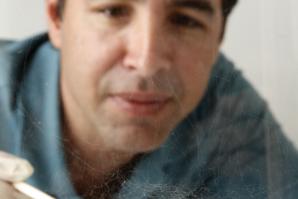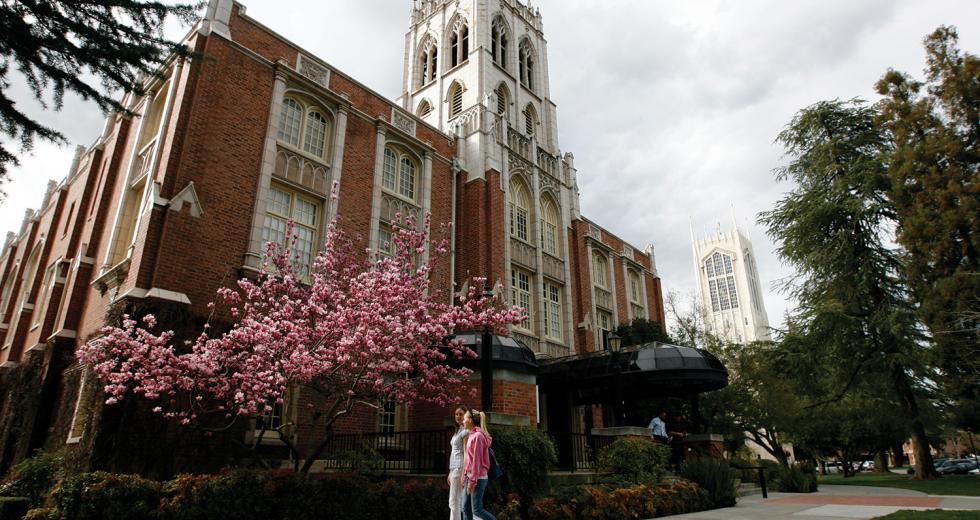The University of the Pacific arrived from San Jose in 1924, planting a brick-and-ivy educational institution in the heart of the San Joaquin agricultural community. Since then, it’s grown to become the second-largest private employer in the county. But, school officials say, the university can still do more in the business community.
‘‘As a financially healthy organization [amid] a struggling community, we have to figure out how we can help to improve the economic base,” says Lewis Gale, dean of the Eberhardt School of Business. “We are more than just a payroll. The university is the steward of the community.”
According to the university, every dollar spent at the Stockton campus generates 56 cents of economic activity in San Joaquin County. During fiscal year 2008, the Stockton campus and its associated economic activities generated $202 million in expenditures. Nearly half of these expenditures, or $92 million, went toward salaries, wages and benefits for the campus’s 1,300 employees.
Further plans under consideration call for creative partnerships and making established university services more widely known and accessible to the community. The Business Forecasting Center, for example, has gained recognition for its reports on the recession, housing crisis and environmental policies. The Institute for Family Business provides a network and forum for family businesses throughout the region. And entrepreneurs seeking potential investors can make presentations to the San Joaquin Angels, a group of local venture capitalists who convene on campus. “We see everything from fly-fishing to cloud computing,” says Mark Plovnick, the university’s director of economic development, about the diversity of proposals brought to the angels.
The university stepped up its outreach in 2008 with the arrival of President Pamela Eibeck. Eibeck’s Beyond Our Gates initiative looks to increase Pacific’s community interaction and explore ways in which the school can assist and benefit local businesses, nonprofits, public education and civic organizations.
“We’ve been in Stockton almost 90 years, and this is the most organized and mission-driven outreach that we’ve had,” says Ted Leland, vice president of external relations. “What [Eibeck] is embarking upon is extraordinary in our history. In the past, most of our community engagement was driven by individuals who saw their personal role as serving the campus and community, but now it’s a matter of what the university itself should do. That’s the difference.”
Eibeck has made civic engagement a top priority of her administration, beginning with a series of public forums designed to bring campus attention to community concerns and needs. Since then, many business leaders have begun to look to the university as a place for ideas and dialogue on how to promote economic health and confidence.
‘‘As a financially healthy organization [amid] a struggling community, we have to figure out how we can help to improve â?¨the economic base.”
Lewis Gale, dean, Eberhardt School of Business
“The university is bringing a fresh perspective to community relations, regenerating long-term connections and making businesses aware of what it has to offer,” says Tom Shaffer, executive vice president and COO of the Bank of Stockton. “It’s at the top of President Eibeck’s list, and you can see it happening.”
Rick Paulsen, a financial consultant with New York Life Insurance Co., says: “The university leads by example. Something special is happening on the campus with its new ideas and positive attitude for partnering. That attitude can really have an impact in our community.”
A new outreach expected to begin this year is The Tomorrow Project, an afterschool and summer program in which faculty and students would work with disadvantaged students. The project seeks to address the link between high dropout rates and an undereducated work force.
Another program in its early stages would encourage youth to consider careers in science, engineering and technology. It would invite collaboration with recently retired NASA astronaut Jose Hernandez, a Pacific graduate and university regent.
“University of the Pacific has a strong tradition of community partnerships on all three of our campuses,” Eibeck says. “From running dental clinics for the homeless, to helping immigrants apply for citizenship, to tutoring disadvantaged children, Pacific is committed to the public good. The Beyond Our Gates initiative is intended to harmonize and expand the university’s community outreach so we can maximize results.”
Building on its public services, educational enrichments and business-friendly forums and workshops, the university is nurturing alliances that Stockton business leaders see as a win-win for all concerned.
“I think the university’s intent is absolutely terrific,” says Brian Martucci, general manager of Berberian European Motors. “It has a tremendous potential to help local businesses and to use local businesses to help its own operations. … The university has so much to offer.”
Recommended For You

Web of Possibilities
A UOP scientist on the verge of a breakthrough
The black widows caged in professor Craig Vierra’s laboratory evoke the macabre. But here, in the Department of Biological Sciences at Stockton’s University of the Pacific, these crawlers are the story’s heroines.

Divine & Conquer
Chancellor Katehi's plan for prosperity
While institutions of higher learning across the state are reeling from budget cuts, tuition hikes, course reductions and faculty and student unrest, Chancellor Linda Katehi has calmly put together a business plan for expansion and prosperity at UC Davis.



